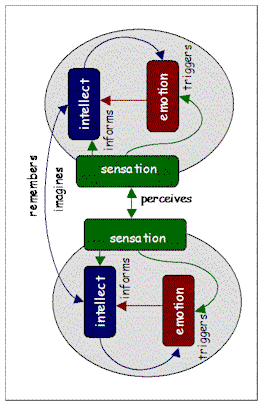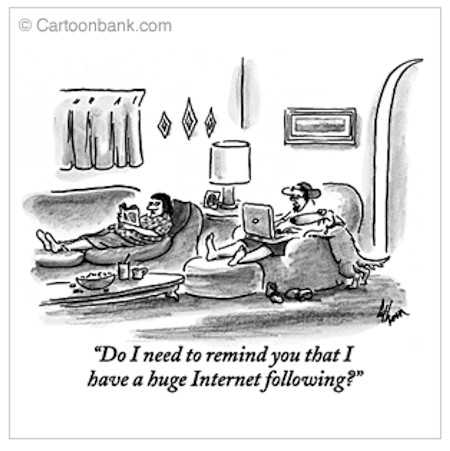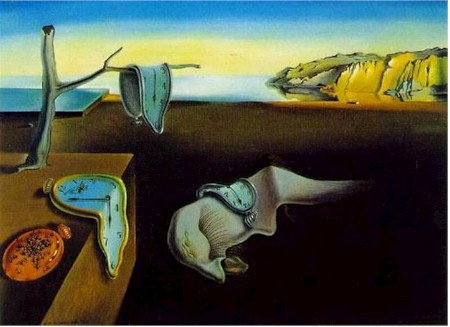 “I Wonder Who We Are Except In Relation to Others?”, Patti Digh asked, somewhat rhetorically, in a recent IM conversation. No question that we are social creatures, and that we cannot live a healthy life alone. But we are more than just social creatures — we have an identity that is innate, a ‘self’ that we are born with. But somehow, this innate self seems to be less and less ‘us’ as the world becomes more crowded, interrelated and complex. And at the same time, we seem, as a species, to be becoming less happy. “I Wonder Who We Are Except In Relation to Others?”, Patti Digh asked, somewhat rhetorically, in a recent IM conversation. No question that we are social creatures, and that we cannot live a healthy life alone. But we are more than just social creatures — we have an identity that is innate, a ‘self’ that we are born with. But somehow, this innate self seems to be less and less ‘us’ as the world becomes more crowded, interrelated and complex. And at the same time, we seem, as a species, to be becoming less happy.
The reason for our modern unhappiness may be simple: We are not ourselves. Each of us actually has three ‘selves’ that are, increasingly, in conflict with each other. ‘You’ are, first of all, a complicity of your body’s organs, evolved by them to protect them from dangers and to help coordinate their actions and movements. Your body, collectively, through chemistry, tells you to do some things in its interest: What to eat, what to feel, who to love and lust for. ‘You’ are, secondly, what is programmed in your DNA, unconscious, instinctive knowledge of how to survive that has evolved over three million years. Your instincts tell you how to respond to situations you don’t have time or mental bandwidth to respond to: When to fight or flee, what is really going on, what makes ‘sense’. And, thirdly, ‘you’ are what your culture indoctrinates you to be, in order to be useful to it. Your culture tells you what to believe, what is ‘right’ and ‘wrong’, who and what is ‘good’ and ‘bad’, how you should live and make a living, and, in a battle with the first ‘you’, what to eat, what to feel, and who to love and lust for. When your physical ‘you’, your instinctive ‘you’ and your cultural ‘you’ are in sync, you are at peace, purposeful, joyful, but when they are in conflict you are stressed, unhappy and, well, conflicted. You are being pulled in three directions at once. And ‘you’ are never in control. After all, you are not yourself. Why would Gaia have evolved us this way, when it seems to be a recipe for unhappiness, even paralysis? Let’s consider two people, the composite ‘yous’ of (a) an indigenous and (b) a modern culture:
U1 learns what to eat, what to feel, who to love and make love with by reconciling what her body tells her to do with what she observes others doing. Individual choice is respected, so any conflicts are resolved quickly and simply in favour of the body’s instructions. In rare cases where the conflict is serious and irreconcilable, when the culture simply cannot accept an individual’s choices, the individual will choose to leave the community, or be forced out. U1’s instincts are finely honed, listened to and trusted. Instinctive judgement is complementary to that of the body and society, and unchallenged. This way of unconflicted living is the way, I think, ‘prehistoric’ humans lived and all non-human creatures live. It is a way of living that has evolved because it works, except in situations of extreme stress: overpopulation, resource scarcity and exhaustion, environmental (habitat) destruction. U2, by contrast, lives in such a state of constant and extreme stress. Her body and instincts cannot adapt themselves to these unnatural scarcities. Her body, in a constant state of trying to cope with stresses that her ‘fight or flight’ responses are no longer adapted to, begins to wear down due to the relentless hyperactivity of stress response chemistry that is, in U1 cultures, only briefly activated. She falls victim to chronic physical and mental diseases unknown in U1 cultures. She is forbidden by a brutal and intrusive, controlling culture to do what her body and instincts tell her to do, and punished severely if she defies that culture, through incarceration, physical abuse, deprivation, theft of her essential needs by the culture, and psychological opprobrium by others in the culture. She begins to hate her body and distrust her instincts. She becomes unhappy and self-loathing, inconsolably conflicted. She becomes chronically physically and mentally ill. This happens because, in cases of extreme stress, Gaia’s solution is to make the society so unhappy it acts, extremely, within itself, to mitigate and eliminate the cause of the stress. In natural societies facing such stress, birth rate plunges, and, in extreme cases, the strongest in the society hoard resources from the rest so at least some will survive the stressful situation. If that isn’t enough, they eat their young. Once the population and resources are again in balance, the stress reactions abate and a U2 culture becomes again a U1 culture. Modern human U2 civilization has now been around for about 30,000 years, and we are taught that this is the only way to live, the only way we have ever lived. We are taught the comforting and outrageous lie that U1 cultures were somehow barbaric and desperate, unhealthy and terrifying and ‘red in tooth and claw’. We have forgotten that U2 states are only supposed to be temporary. Well-intentioned, we have perpetuated this U2 state, and we continue to deny its utter unsustainability. Our third, cultural ‘yous’ have, in the process, become more pervasive, more controlling, more ruthless, and more violent with each passing century. Gaia is now, reluctantly, giving up waiting for us to rectify our own behaviour and is now taking things into her own hands. What is left of our instincts knows that this will not be pleasant, and this knowledge is adding even more to our unbearable stress. So if you are, in your heart, anxious, unhappy, and conflicted, it is not surprising. It is easy to say that we should learn to be self-aware, self-knowing, humble, that we should keep our sense of humour and laugh at the impossibility of resolving these conflicts. That we should pay attention to our bodies and our senses and our instincts and trust them, accommodate them, understand the truths about ourselves that they teach us. We are all so busy struggling with the consequences of these conflicts and stresses that it is hard to get above them, to focus on the causes. As hard as it is to do, we should strive to create the time and space to be at peace with ourselves. To love our conflicted, absurd selves, as they try impossibly to adapt to a situation that is dreadful, ghastly, not long for this world. What our three selves try to get us to do cannot be reconciled, but neither can any of these selves be subverted. So we have to know our selves well enough to resolve the conflicts between them, and to make some courageous, and probably unpopular, decisions. We must learn to define ourselves less in relation to others and more in terms of what makes us uniquely us, if we can rediscover, or discover for the first time, who that is. Not in order to be nobody-but-ourselves — it is far too late for that. Just to be happy. Category: Being Human
|
Navigation
Collapsniks
Albert Bates (US)
Andrew Nikiforuk (CA)
Brutus (US)
Carolyn Baker (US)*
Catherine Ingram (US)
Chris Hedges (US)
Dahr Jamail (US)
Dean Spillane-Walker (US)*
Derrick Jensen (US)
Dougald & Paul (IE/SE)*
Erik Michaels (US)
Gail Tverberg (US)
Guy McPherson (US)
Honest Sorcerer
Janaia & Robin (US)*
Jem Bendell (UK)
Mari Werner
Michael Dowd (US)*
Nate Hagens (US)
Paul Heft (US)*
Post Carbon Inst. (US)
Resilience (US)
Richard Heinberg (US)
Robert Jensen (US)
Roy Scranton (US)
Sam Mitchell (US)
Tim Morgan (UK)
Tim Watkins (UK)
Umair Haque (UK)
William Rees (CA)
XrayMike (AU)
Radical Non-Duality
Tony Parsons
Jim Newman
Tim Cliss
Andreas Müller
Kenneth Madden
Emerson Lim
Nancy Neithercut
Rosemarijn Roes
Frank McCaughey
Clare Cherikoff
Ere Parek, Izzy Cloke, Zabi AmaniEssential Reading
Archive by Category
My Bio, Contact Info, Signature Posts
About the Author (2023)
My Circles
E-mail me
--- My Best 200 Posts, 2003-22 by category, from newest to oldest ---
Collapse Watch:
Hope — On the Balance of Probabilities
The Caste War for the Dregs
Recuperation, Accommodation, Resilience
How Do We Teach the Critical Skills
Collapse Not Apocalypse
Effective Activism
'Making Sense of the World' Reading List
Notes From the Rising Dark
What is Exponential Decay
Collapse: Slowly Then Suddenly
Slouching Towards Bethlehem
Making Sense of Who We Are
What Would Net-Zero Emissions Look Like?
Post Collapse with Michael Dowd (video)
Why Economic Collapse Will Precede Climate Collapse
Being Adaptable: A Reminder List
A Culture of Fear
What Will It Take?
A Future Without Us
Dean Walker Interview (video)
The Mushroom at the End of the World
What Would It Take To Live Sustainably?
The New Political Map (Poster)
Beyond Belief
Complexity and Collapse
Requiem for a Species
Civilization Disease
What a Desolated Earth Looks Like
If We Had a Better Story...
Giving Up on Environmentalism
The Hard Part is Finding People Who Care
Going Vegan
The Dark & Gathering Sameness of the World
The End of Philosophy
A Short History of Progress
The Boiling Frog
Our Culture / Ourselves:
A CoVid-19 Recap
What It Means to be Human
A Culture Built on Wrong Models
Understanding Conservatives
Our Unique Capacity for Hatred
Not Meant to Govern Each Other
The Humanist Trap
Credulous
Amazing What People Get Used To
My Reluctant Misanthropy
The Dawn of Everything
Species Shame
Why Misinformation Doesn't Work
The Lab-Leak Hypothesis
The Right to Die
CoVid-19: Go for Zero
Pollard's Laws
On Caste
The Process of Self-Organization
The Tragic Spread of Misinformation
A Better Way to Work
The Needs of the Moment
Ask Yourself This
What to Believe Now?
Rogue Primate
Conversation & Silence
The Language of Our Eyes
True Story
May I Ask a Question?
Cultural Acedia: When We Can No Longer Care
Useless Advice
Several Short Sentences About Learning
Why I Don't Want to Hear Your Story
A Harvest of Myths
The Qualities of a Great Story
The Trouble With Stories
A Model of Identity & Community
Not Ready to Do What's Needed
A Culture of Dependence
So What's Next
Ten Things to Do When You're Feeling Hopeless
No Use to the World Broken
Living in Another World
Does Language Restrict What We Can Think?
The Value of Conversation Manifesto Nobody Knows Anything
If I Only Had 37 Days
The Only Life We Know
A Long Way Down
No Noble Savages
Figments of Reality
Too Far Ahead
Learning From Nature
The Rogue Animal
How the World Really Works:
Making Sense of Scents
An Age of Wonder
The Truth About Ukraine
Navigating Complexity
The Supply Chain Problem
The Promise of Dialogue
Too Dumb to Take Care of Ourselves
Extinction Capitalism
Homeless
Republicans Slide Into Fascism
All the Things I Was Wrong About
Several Short Sentences About Sharks
How Change Happens
What's the Best Possible Outcome?
The Perpetual Growth Machine
We Make Zero
How Long We've Been Around (graphic)
If You Wanted to Sabotage the Elections
Collective Intelligence & Complexity
Ten Things I Wish I'd Learned Earlier
The Problem With Systems
Against Hope (Video)
The Admission of Necessary Ignorance
Several Short Sentences About Jellyfish
Loren Eiseley, in Verse
A Synopsis of 'Finding the Sweet Spot'
Learning from Indigenous Cultures
The Gift Economy
The Job of the Media
The Wal-Mart Dilemma
The Illusion of the Separate Self, and Free Will:
No Free Will, No Freedom
The Other Side of 'No Me'
This Body Takes Me For a Walk
The Only One Who Really Knew Me
No Free Will — Fightin' Words
The Paradox of the Self
A Radical Non-Duality FAQ
What We Think We Know
Bark Bark Bark Bark Bark Bark Bark
Healing From Ourselves
The Entanglement Hypothesis
Nothing Needs to Happen
Nothing to Say About This
What I Wanted to Believe
A Continuous Reassemblage of Meaning
No Choice But to Misbehave
What's Apparently Happening
A Different Kind of Animal
Happy Now?
This Creature
Did Early Humans Have Selves?
Nothing On Offer Here
Even Simpler and More Hopeless Than That
Glimpses
How Our Bodies Sense the World
Fragments
What Happens in Vagus
We Have No Choice
Never Comfortable in the Skin of Self
Letting Go of the Story of Me
All There Is, Is This
A Theory of No Mind
Creative Works:
Mindful Wanderings (Reflections) (Archive)
A Prayer to No One
Frogs' Hollow (Short Story)
We Do What We Do (Poem)
Negative Assertions (Poem)
Reminder (Short Story)
A Canadian Sorry (Satire)
Under No Illusions (Short Story)
The Ever-Stranger (Poem)
The Fortune Teller (Short Story)
Non-Duality Dude (Play)
Your Self: An Owner's Manual (Satire)
All the Things I Thought I Knew (Short Story)
On the Shoulders of Giants (Short Story)
Improv (Poem)
Calling the Cage Freedom (Short Story)
Rune (Poem)
Only This (Poem)
The Other Extinction (Short Story)
Invisible (Poem)
Disruption (Short Story)
A Thought-Less Experiment (Poem)
Speaking Grosbeak (Short Story)
The Only Way There (Short Story)
The Wild Man (Short Story)
Flywheel (Short Story)
The Opposite of Presence (Satire)
How to Make Love Last (Poem)
The Horses' Bodies (Poem)
Enough (Lament)
Distracted (Short Story)
Worse, Still (Poem)
Conjurer (Satire)
A Conversation (Short Story)
Farewell to Albion (Poem)
My Other Sites










 these days i worry about everything:
these days i worry about everything:



